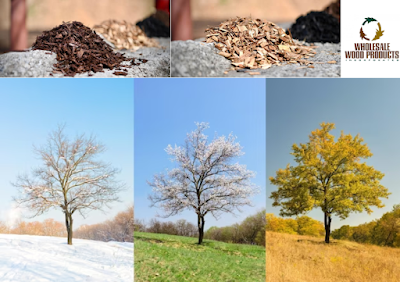4 Best Mulching Practices for Different Seasons
Mulching is a key gardening practice that provides a myriad of benefits. Conserving soil moisture, suppressing weeds, and enhancing soil health are some of the reasons why people use mulch in Atlanta area. However, successful mulching requires adjusting your approach according to the changing seasons. Each season presents unique challenges and opportunities for your garden. Reading further, we will know about the best practices for mulching during different seasons, helping you make informed decisions to keep your plants thriving year-round.
1 Spring Mulching
As the temperatures rise and nature awakens, spring is the time to prepare your garden for a bountiful growing season. To start, remove any debris, dead leaves, and weeds that accumulated over the winter. As the soil begins to warm up, apply mulch early in the season to take advantage of its moisture-retaining properties. Opt for organic mulch like wood chips, straw, or compost, as it gradually decomposes, enriching the soil with valuable nutrients.
 |
| 4 Best Mulching Practices for Different Seasons |
Be cautious not to mulch too early in spring when the soil is still cold and damp, as it may delay plant growth. Wait for the soil to warm up before applying the mulch. Focus on mulching around established plants to retain soil moisture and suppress weed growth. Additionally, consider mulching around newly planted perennials and shrubs to help them establish strong root systems before the hotter months arrive.
2 Summer Mulching
Summer brings its fair share of challenges, with scorching temperatures and increased water demands. To combat these issues, maintain a fresh layer of mulch to conserve soil moisture and protect your plants from heat. A 2 to 3-inch layer of mulch is sufficient to keep the soil cool and prevent excessive evaporation. Regularly monitor the mulch layer to prevent compaction, which can hinder water penetration and root health. Adjust the mulch thickness as needed to ensure optimal performance. Remember to extend mulch rings around trees and shrubs to provide a buffer against the intense heat.
3 Fall Mulching
Fall is a time of transition, as the growing season slows down, and cooler temperatures prevail. In early fall, renew your mulch layer by removing any old or decomposed mulch and apply a fresh layer. As the temperatures drop, mulch acts as a protective blanket, insulating plant roots from freezing temperatures. Focus on protecting newly planted perennials and trees, especially those susceptible to frost heaving or cold damage. Apply a thicker layer of mulch (around 3 to 4 inches) to offer adequate protection. Proper mulching in the fall can ensure your plants enter the winter months in optimal condition.
4 Winter Mulching
Winter presents unique challenges for gardening, particularly in regions with harsh climates. As the growing season comes to an end, make sure to mulch plants that are susceptible to frost damage or frost heaving. Mulch acts as a barrier against extreme cold and helps maintain stable soil temperatures. However, be cautious not to apply excessive mulch around the base of plants, as it can create a haven for pests and diseases. Instead, create a donut shape around the plant, leaving a small gap around the stem or trunk.
General Mulching Tips
Use organic mulch to provide long-term soil enrichment and nutrient supply.
Keep mulch away from plant stems to prevent rot and pest issues.
Clear any weeds before mulching to prevent them from growing through the mulch layer.
Replenish mulch regularly to maintain the desired thickness and maximize its benefits.
Conclusion
Mulching during different seasons is a dynamic and crucial aspect of successful gardening. Wholesale Wood Products elaborates that adapting your mulching practices according to the changing weather conditions ensures your plants receive the support they need for robust growth. We are manufacturing the finest quality mulch in Norcross area for a long time. Our sole aim is to conserve your resources and promote a healthy garden environment year-round.

.png)

Comments
Post a Comment